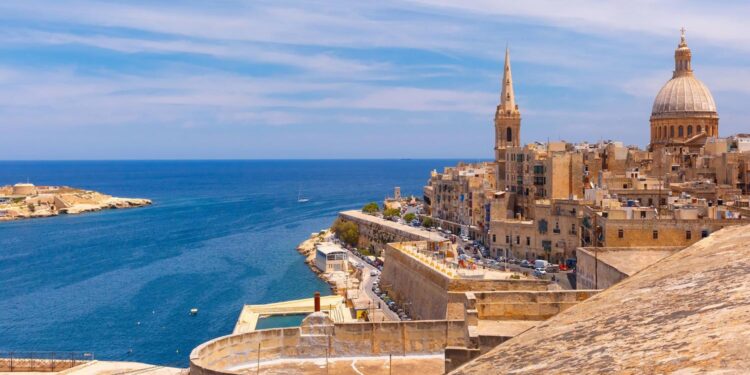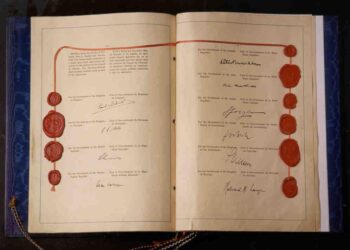Introduction
In a world increasingly defined by economic alliances and trade wars,Malta has chosen a path of neutrality in response to recent developments surrounding U.S. President Donald trump’s announcement of new tariffs on European imports. Instead of taking a firm stance, the Mediterranean island nation has opted to defer to the European Commission for guidance on how to navigate the potential implications of thes tariffs. This decision reflects Malta’s strategic positioning within the EU framework and highlights the complexities of international trade relations. As discussions evolve, Malta’s pragmatic approach may offer insights into the broader European response to ongoing challenges in transatlantic trade.
Malta’s Stance on EU Tariffs: A Neutral Perspective
Amid rising tensions over trade relations between the United states and the european Union, Malta has adopted a measured approach regarding the recent EU tariffs announced by President Trump. By choosing not to take a definitive stance, the Maltese government emphasizes its commitment to unity among EU member states and aligns with the European Commission’s positions. Key aspects of Malta’s neutrality include:
- Support for Collective Decision-Making: Malta prioritizes consensus within the EU to ensure a robust regional response.
- Economic Interests: The nation seeks to protect its trade relationships while avoiding potential repercussions from unilateral actions.
- focus on Mediation: Malta positions itself as a mediator, fostering dialog between the EU and the U.S.to resolve trade disputes.
Representing a small but strategic player within the EU, Malta’s decision to defer to the European Commission highlights a broader strategy to maintain stability in the region’s economic landscape. This approach reflects an understanding of the interconnectedness of European economies and the potential risks associated with protectionist measures. A recent analysis outlines the implications for Malta and the EU, including:
| Potential Outcomes | Implications for Malta |
|---|---|
| Increased Tensions | Economic uncertainty affecting trade |
| Retaliatory Tariffs | Potential rise in prices of imports |
| Continued Dialogue | Opportunity for diplomatic engagement |
Understanding Trump’s EU tariff Announcement and Its Implications
As the complexities of international trade continue to evolve, Trump’s recent tariff announcement on the European Union has generated significant discourse among EU member states, including Malta. While some countries have quickly responded to clarify their positions,Malta has opted for a diplomatic stance,emphasizing its commitment to the European Commission’s authority in these matters. This decision reflects Malta’s longstanding policy of neutrality, aiming not to exacerbate tensions while awaiting further guidance on the implications of the tariffs and potential retaliatory measures from the EU.
In assessing the potential fallout from these tariffs, several factors come into play that may affect not only trade dynamics but also the broader economic landscape within the EU:
- Economic Impact: Tariffs could lead to increased costs for consumers and businesses, especially in sectors heavily reliant on imports from the U.S.
- Trade Relationships: EU members may need to recalibrate their trade agreements to lessen the impact on their economies.
- Political Reactions: the announcement may induce a wave of negotiations aimed at mitigating the effects of the tariffs, revealing diverging interests among EU countries.
| Factor | Potential Outcome |
|---|---|
| Increased Tariffs | Higher import costs |
| Retaliation | Escalation of trade tensions |
| Market Adaptations | Shift in supply chains |
The European Commission’s Role in Malta’s Trade strategy
The European Commission plays a pivotal role in shaping Malta’s trade strategy, particularly in light of recent developments such as President Trump’s tariff announcements. As a member of the EU, Malta adheres to common policies and frameworks established by the Commission, which includes negotiating trade agreements and setting guidelines for external trade relations. This allows Malta not only to protect its economic interests but also to benefit from the larger trade network of the EU. The Commission’s actions ensure that Malta can leverage its position within the union to mitigate the impacts of global trade tensions, all while maintaining a stable and neutral stance.
Moreover, the European Commission actively supports Malta by providing resources and tools to enhance its trade capacity. These include:
- Trade navigators: Tools that assist Maltese businesses in understanding market access conditions.
- Financial Aid: Funding opportunities for trade-related projects aimed at strengthening competitiveness.
- Policy Frameworks: Guidelines that help align Malta’s trade practices with EU standards.
Such initiatives bolster Malta’s position in the global market while ensuring that local industries remain adaptive and resilient in the face of challenges posed by unilateral trade actions. Ultimately, the cooperation between Malta and the Commission demonstrates a unified approach to trade, emphasizing stability and strategic response.
Potential economic Impacts of Tariffs on Malta’s Industries
The introduction of tariffs by the United States and the subsequent response from the European Union could substantially influence Malta’s economy, particularly its key sectors. As a tourism-dependent nation, Malta’s hospitality and service industries may experience a ripple effect. Increased costs for imported goods due to tariffs could lead to higher prices for tourists, possibly deterring visitors or reducing their spending power. This scenario could be compounded by a rise in operational costs for local businesses reliant on imports, such as those in the hospitality and retail sectors, which may need to adjust their pricing strategies to maintain profit margins.
Furthermore, industries such as manufacturing and agriculture might face direct challenges from increased tariffs on exported Maltese goods. as trade barriers rise, the competitiveness of Maltese products in foreign markets could diminish, resulting in reduced export volumes. This situation may force local producers to reassess their business models, seeking choice markets or investing in adaptations to resist the impact of tariffs. Below is a summarized view of potential economic impacts:
| industry Sector | Potential Impact |
|---|---|
| Tourism | Decrease in tourist spending and visitor numbers |
| Manufacturing | Reduced exports, need for market diversification |
| Agriculture | Increased costs for exports, pressure on pricing |
| Retail | Higher import costs leading to potential price hikes |
Analysis of Malta’s Diplomatic Approach to Trade Disputes
In response to the recent announcements regarding tariffs imposed by the Trump administration on European goods, Malta has strategically decided to maintain its conventional stance of neutrality. This approach reflects the nation’s commitment to deferring such matters to the broader framework of the European Commission (EC). As a member state of the European Union,Malta recognizes the importance of a unified response over individualistic measures,thereby prioritizing collective negotiation and dialogue. Key to this strategy are several facets:
- Collaborative Diplomacy: Malta emphasizes engagement with EU partners to ensure a cohesive trade policy.
- Economic Stability: By refraining from unilateral action,malta seeks to protect its economic interests and promote stability.
- Long-term Vision: Acknowledging that hasty decisions could lead to retaliatory measures, Malta underscores patience in resolving disputes.
Moreover, Malta’s handling of its diplomatic engagements illustrates a careful balancing act between national interests and EU obligations. Evaluating trade tensions thru the lens of its geopolitical landscape allows Malta to leverage various diplomatic channels. The following table outlines the potential impacts of the tariff disputes on Malta’s trade relationships:
| Trade Partner | Impact assessment | Mitigation Strategy |
|---|---|---|
| United States | Increased tariffs may diminish exports. | Diversifying market outreach. |
| European Union | Solidarity effects may stabilize the internal market. | Engaging in joint negotiations. |
| Global Market | Potential shift in supply chains. | Enhancing trade partnerships. |
Recommendations for Strengthening Malta’s Trade Policies
To enhance Malta’s role in the evolving trade landscape, it is imperative that the government implements a series of strategic measures aimed at strengthening its trade policies. Diversifying trade partnerships can mitigate dependence on any single market,allowing Malta to adapt more effectively to global shifts.This can be achieved by:
- Engaging in bilateral trade agreements with emerging economies.
- Fostering closer ties with other EU member states to reinforce intra-EU trade.
- encouraging participation in international trade organizations to increase visibility and influence.
Furthermore, it would be beneficial for Malta to enhance its trade infrastructure and support systems. Investment in technological advancements within the logistics and shipping sectors can streamline operations and reduce costs. The establishment of comprehensive training programs for local businesses on navigating complex international regulations will ensure that Maltese companies remain competitive. Key initiatives should include:
- Implementing e-commerce platforms to promote local products globally.
- Setting up trade advisory services tailored to assist businesses in export initiatives.
- Expanding market intelligence resources to help businesses understand different trade environments.
The Importance of Maintaining Neutrality in International Relations
In today’s complex global landscape, maintaining a stance of neutrality is crucial for small nations such as Malta, particularly when it comes to navigating international economic disagreements. Malta’s decision to refrain from taking a side on President Trump’s recent announcement regarding tariffs imposed on European Union products exemplifies a prudent approach to diplomacy. By deferring to the European Commission, Malta not only emphasizes its commitment to collective European interests but also avoids entangling itself in contentious bilateral disputes, which could have wider economic implications.
Several key benefits arise from this neutral stance:
- Preservation of Trade Relationships: By not siding with either party, Malta safeguards its trade relations with both the U.S.and the EU.
- Enhanced Diplomatic Leverage: Neutrality allows Malta to act as a mediator and gain diplomatic capital with other states, enhancing its global standing.
- Focus on National Interests: This approach enables Malta to prioritize its own economic stability and interests without needless external pressures.
| Factors | Advantages |
|---|---|
| Neutral Stance | Protects trade ties |
| Diplomatic Relations | Facilitates conflict resolution |
| National Policy | Encourages self-determined actions |
Exploring Malta’s Future Trade Agreements Post-Tariff Announcement
As Malta navigates the uncertain waters of global trade following the recent tariff announcement by former President Trump, the focus shifts towards future trade agreements that could redefine the nation’s economic landscape. The Maltese government’s decision to remain neutral signifies a strategic approach to maintaining relationships with both the European Union (EU) and the United States. By deferring to the European Commission, Malta is prioritizing collective EU action, which can be critical in counterbalancing unilateral decisions that may impact trade dynamics. This stance not only emphasizes Malta’s commitment to EU cohesion but also preserves its diplomatic flexibility.
Looking ahead,several key factors will shape Malta’s trade strategy in the evolving global landscape:
- New Trade Partnerships: Malta is exploring potential trade agreements with emerging markets that can diversify its economic dependencies.
- EU Trade Policies: Adapting to broader EU strategies will remain essential as new tariffs could spur shifts in trade flows across member states.
- Impact of global Economic trends: Monitoring global economic health will be crucial for Malta to anticipate market demands and threats.
| Trade Aspect | Current Status | Future Outlook |
|---|---|---|
| Tariff Negotiations | Under Review | Sustained dialogue needed |
| new Partners | Identifying Opportunities | Potential Agreements in 2023 |
| EU Relations | Strong Cohesion | Collaborative Strategies |
Engaging Stakeholders: The Role of Local Businesses in Trade Discussions
Local businesses play a crucial part in shaping trade policies and discussions, especially in light of geopolitical shifts like Trump’s recent tariff announcements. Their insights can bridge the gap between policymakers and the community, illustrating the real-world implications of tariff changes. Engaging these entities not only fosters a robust dialogue between governments and the private sector but also helps gather crucial feedback on how such tariffs can impact local economies. Key elements that highlight the role of local businesses include:
- Market Insights: Local enterprises can provide firsthand accounts of how changing tariffs affect pricing and market access.
- Advocacy: These businesses frequently enough have established relationships with stakeholders, making them effective advocates for necessary policy adjustments.
- Job Creation: Local companies are vital for employment; their perspectives can influence decisions that impact job security and growth.
Furthermore,businesses have a unique understanding of consumer behavior,which can be critical during trade discussions. With their finger on the pulse of community needs, they can offer strategic recommendations on how to mitigate negative impacts stemming from new tariffs. Notable considerations for local businesses include:
| Consideration | Description |
|---|---|
| Adaptability | Businesses can pivot strategy based on emerging tariff impacts. |
| Collaboration | Forming coalitions with other local entities can amplify their voices in trade discussions. |
| Innovation | Local firms can innovate to mitigate costs and maintain competitiveness. |
Long-Term Strategies for Malta’s Economic Resilience Amid Global Trade Tensions
The ongoing global trade tensions, particularly in the context of changes in U.S. tariff policies under the Trump administration, pose a complex challenge for Malta’s economic landscape. In response to such geopolitical shifts, Malta must adopt a multifaceted approach to bolster its economic resilience. This involves fostering diversification in its economic sectors,emphasizing high-value industries like technology and finance as well as traditional sectors such as tourism and shipping. By investing in innovation and sustainability, Malta can mitigate dependency on fluctuating international markets and maintain its competitive edge.
To further ensure long-term economic stability, Malta should enhance its collaboration with European Union partners. A focus on strategic alliances can empower Malta to navigate international uncertainties and trade dynamics effectively.Concrete measures could include:
- Strengthening partnerships in research and development projects.
- Promoting a unified EU trade policy that supports small and medium enterprises (SMEs) affected by tariffs.
- Encouraging foreign direct investment (FDI) in priority sectors.
Additionally, Malta can leverage its strategic geographical position within the mediterranean to act as a logistical and trade hub, attracting businesses that seek a stable European base amidst global disruptions. Investing in infrastructure improvements and digital change will be critical in this pursuit, ensuring that Malta remains an attractive option for investors and a resilient player in the evolving global economy.
Future Outlook
Malta’s decision to maintain neutrality regarding Trump’s recent tariff announcement underscores the nation’s commitment to the broader principles of European cooperation and collective decision-making. by deferring to the European Commission, Malta not only aligns itself with the EU’s established protocols but also emphasizes the importance of unity in addressing complex trade issues. As tensions rise and economic strategies evolve on both sides of the Atlantic, the Maltese government’s stance serves as a reminder of the delicate balance between national interests and European solidarity. Moving forward, how other EU member states respond to these developments will be crucial in shaping the future of transatlantic relations and trade dynamics. As the implications of such tariffs unfold, Malta’s measured approach may offer a model for diplomatic engagement in an increasingly polarized global landscape.
















Sarina Wiegman lauds England after they ‘kept it simple’ in Belgium mauling – MSN